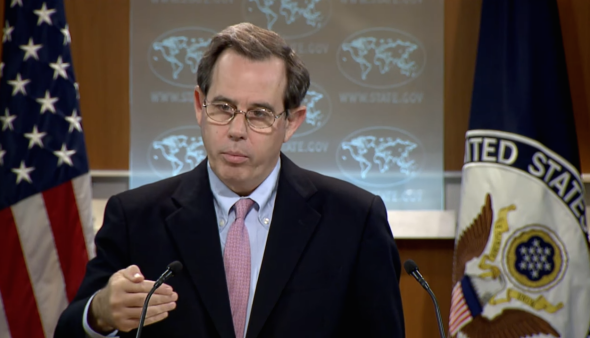State Department Official Pauses a Full 20 Seconds to Come Up Non-Response on U.S. Commitment to Democracy

Watch as Stuart Jones, a high-level acting official in the State Dept, is asked why they criticize Iranian elections but never Saudi Arabia: pic.twitter.com/RLkKGn48Z7
— Alex Emmons (@AlexanderEmmons) May 30, 2017
How far has the Donald Trump administration strayed from the contemporary mainstream of American statecraft? On Tuesday, we got another example of an administration far in the weeds—ideologically and functionally—during a State Department briefing on Trump’s first foreign trip. The briefing was held by State Department veteran Stuart Jones. Jones is Acting Assistant Secretary of State for Near Eastern Affairs and accompanied the president and Secretary of State Tillerson on the first—and perhaps most ludicrous—leg of the president’s trip to Saudi Arabia.
The Q&A began according to plan—and uneventfully—with questions on human rights and defense deals in Saudi Arabia before Agence France-Presse diplomatic correspondent Dave Clark wrapped up the presser with a reasonable, but not a barnburner of a question:
QUESTION: … While you were over there, the Secretary criticized the conduct of the Iranian elections and Iran’s record on democracy. He did so standing next to Saudi officials. How do you characterize Saudi Arabia’s commitment to democracy, and does the administration believe that democracy is a buffer or a barrier against extremism?
Instead of spitting out a canned response or any response at all, Jones paused to collect his thoughts and formulate an answer at the podium for… a… full… 20 seconds. It was an astounding moment, particularly for a State Department official, like Jones, for whom this is not his first rodeo. Jones was asked similar questions during the briefing on, for example, Saudi Arabia’s human rights record. Here’s the diplo-speak answer he gave to that line of questioning: “[O]n the issue of Saudi and other human rights… human rights continues to be part of our bilateral dialogue with Saudi and all the other countries in the region.”
But when it came to the U.S.’s belief in, ahem, democracy abroad Jones didn’t have an answer. And this from someone who worked in Iraq, served as an ambassador in the Middle East, and knows a thing or two about illiberalism. He’s certainly answered far pricklier questions than this one before. Jones knows how to toe the rhetorical line of American policy. But here he was stumped. Which begs the question: Has the line changed? Democracy used to kind of be our thing. We still think democracy is a good thing, right? Stuart?
I think what we’d say is that at this meeting we were able to make significant progress with Saudi and [Gulf Cooperation Council] partners in both making a strong statement against extremism and also—and also putting in place certain measures through this GCC mechanism where we can combat extremism. Clearly, one source of extremism, one terrorism threat, is coming from Iran, and that’s coming from a part of the Iranian apparatus that is not at all responsive to its electorate.
“I think what we’d say is…”
I’m going to take that as a maybe.
